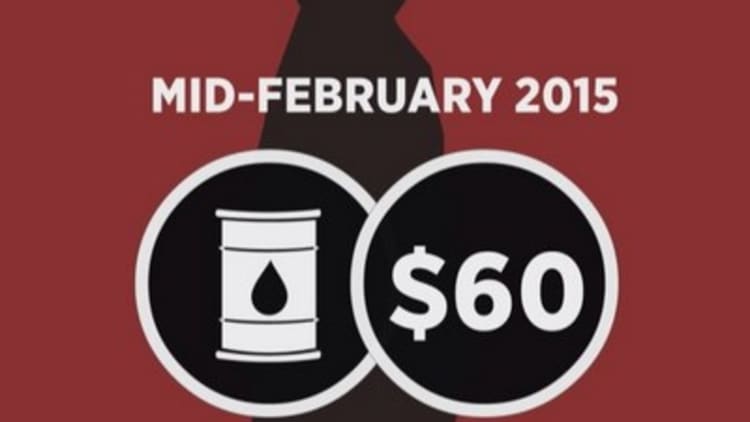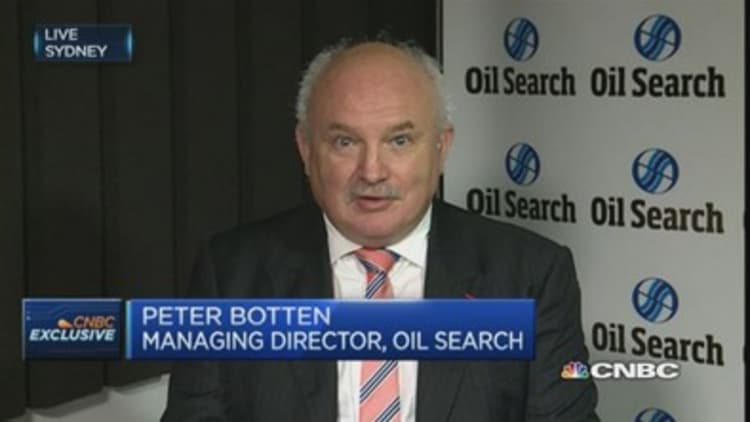
Any hopes of a sustained rally in the price of oil disappeared Tuesday morning as doubts were raised over an anticipated cut in production from the Organization of the Petroleum Exporting Countries (OPEC).
The oil cartel is not due to meet until June this year but - with comments by Diezani Alison-Madueke, the Nigerian oil minister - suggested that an emergency meeting was due in the near term. This raised hopes that OPEC could cut production, something it had refused to do back at its last meeting in November 2014.
An anonymous delegate from the group denied these claims, telling Bloomberg overnight there was no emergency meeting planned. Brent crude futures dropped to 58.56 a barrel by 8:00 a.m. GMT on Tuesday and U.S. crude was back at $48.97 a barrel after climbing above $50 on Tuesday afternoon. OPEC was not immediately available for comment when contacted by CNBC.
S&P to rally?
The dramatic fall in the price of oil—which tanked as much as 60 percent from mid-June last year—has been due to weak demand, a strong dollar and booming U.S. oil production, according to the International Energy Agency (IEA). OPEC's reluctance to cut its output has also been seen as a key reason behind the fall. The group produces about 40 percent of the world's crude oil.
Some analysts have told CNBC that there is a global "game of chicken" being played out between the Gulf states and U.S. shale producers, over who can absorb the dip in prices and not cut back on production.
Saudi Arabia is the world's top exporter of oil and one of the biggest producers. The country is the main swing producer in the Gulf region and is able to cut and expand production more freely than some of its neighbors. Alison-Madueke told the FT on Monday that most OPEC countries - except the Arab bloc - were very uncomfortable with the current price of oil.
"Oil should remain a well-supplied market, with U.S. tight oil (shale oil) keeping OPEC in check," a team at Barclays, led by Keith Parker, said in a note on Tuesday morning.
The bank believes that lower oil prices are likely to persist with demand growth slowing due to energy efficiency and lower aggregate growth globally. However, on the plus side it also believes that growth will get a boost from lower prices and highlighted that the usually climbs 12 percent the year after an oil trough.
UK industry slumps

The dramatic fall in oil has tested global oil majors as well as smaller shale producers in the U.S.. BHP Billiton on Monday evening announced that it was cutting back on its expenditure for shale. It will reduce its rig count this year from 26 to 15 and highlighted a 15 percent cut in spending. It has also shelved plans to sell its Fayetteville shale business in Arkansas.
It remained upbeat on the price of oil, however, saying that a cyclical rebalancing of the market was already under way as supply is reduced. The medium-term outlook appears positive, according to the basic resources firm, as it believed that higher prices would be required to "induce the new supply needed to offset natural field decline."
Meanwhile, there was dismal news out from the U.K. The country's oil and gas industry experienced a negative cash flow of £5.3 billion ($8.2 billion) in 2014, according to a new report by industry body Oil and Gas U.K. This was the worst seen since the 1970s. Production revenues were also the lowest since 1998 and exploration has "collapsed" with the number of new wells last year falling to its lowest since the 1960s, it said.
"These are exceptionally worrying leading indicators of where this industry might be heading," the report on Tuesday said.


